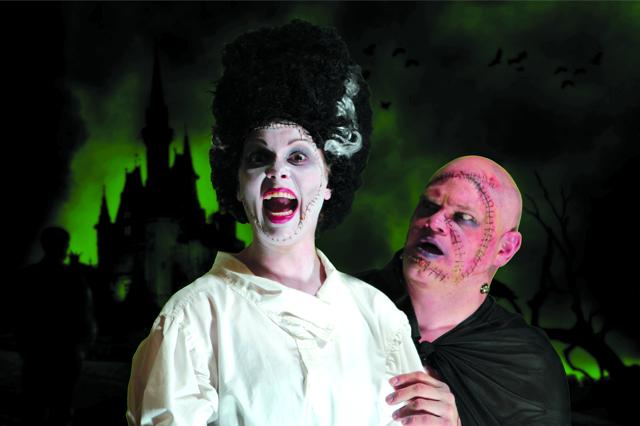This is what Steven Samuels learned while writing Love Among the Frankensteins:
• There are a lot of bad Frankenstein movies out there.
• Mary Shelley, who penned the original gothic novel, was a bawdy writer.
• Low-brow humor and high-brow dialogue love each other.
Love Among the Frankensteins revolves around Henry Victor Frankenstein Whale, a wealthy filmmaker who is a descendant of the Frankensteins and James Whale, the real-life director of the classic movies Frankenstein and Bride of Frankenstein. At a crucial moment in his career, Henry Whale moves to Castle Frankenstein (it really exists in Germany) to find Frankenstein’s monster and his bride living there and working on an experiment that will either solve Whale’s problems or contribute to his demise.
The play builds on the success of the Magnetic Field’s production of When Jekyll Met Hyde, which Samuels also wrote. Looking for another monster hit, producer Chall Gray suggested a follow-up. Intrigued, Samuels decided to write the play in the style of the Theatre of the Ridiculous, a surrealist approach to playwriting and acting that honors improvisation in performances that are often commentaries on contemporary life.
In a former world, Samuels worked at The Ridiculous Theatrical Company in New York City with Charles Ludlam, an influential figure in the movement. Ludlam helped advance the “ridiculous” style, which is farcical and selective, forcing the playwright to take bits and pieces of dialogue and plot from plays and text and slam them together with dialogue from classical literature and comic pop songs.
Samuels researched all things Frankenstein, starting with Mary Shelley’s gothic novel Frankenstein, proceeding to her letters and diaries (“a much more powerful writer than I realized,” Samuels concluded) and ending chronologically with recent-release Frankenstein movies (most of which are pretty dreadful, in Samuels’ eyes).
Samuels wrote as he researched, not knowing where the story would go. The script he came up with is entirely original and was written with specific actors in Samuel’s busy mind. As he worked, he heard the voices of actors Tracey Johnston-Crum, Darren Marshall, Alphie Hyorth, Joan Atwood, Courtney DeGennaro and others. He locked on to material that suited their talents. If someone dropped out, Samuels had to rewrite.
“So in a sense, I was more than writing the script — I was writing the production, which is a very different way of thinking about the theater,” Samuels said recently at Magnetic Field. That’s the way Shakespeare wrote, Samuels said — under tremendous pressure to keep the Globe Theatre afloat, writing plays for the people it employed.
“It’s a grand tradition and one that I find particularly lively,” he said. It calls for freshness and references today’s day and time.
“Fresh” is the operative word in a writing process that, two weeks into rehearsal, had resulted in only a draft of the second act. Samuels had hoped to be further along, but he said he was “invigorated” by the exercise and the organic, changing nature of the production. The actors, he said, were similarly enthused.
“As the actors began to understand the nature of the play, they began to move and create bits of business that were as inventive what I was doing. I then become an editor,” he said. “Some had lines they always wanted to say, which pushed me to create something astounding on stage.
“It’s a very exciting way to work.”
— Paul Clark can be reached at paulgclark@charter.net.
what: Love Among the Frankensteins
where: Magnetic Field, 372 Depot St., Asheville
when: Through June 9 (Shows Thursdays through Saturdays)




Most grateful for this article. But Mary Shelley’s writing “bawdy?” I don’t think so. But this show is…
So when are we going to see a review?
To answer theatergoer,it appears that Mountain X doesn’t review shows anymore, since the last review was for Circle Mirror Transformation back in the beginning of April. I wouldn’t hold your breath.
Also mentioned Moliere. Wasn’t talking about the quality of the writing but the nature of the circumstances; i.e., having an established company, writing for specific actors, etc.; also, writing in the moment, rather than–as tends to be the case these days–years in advance.